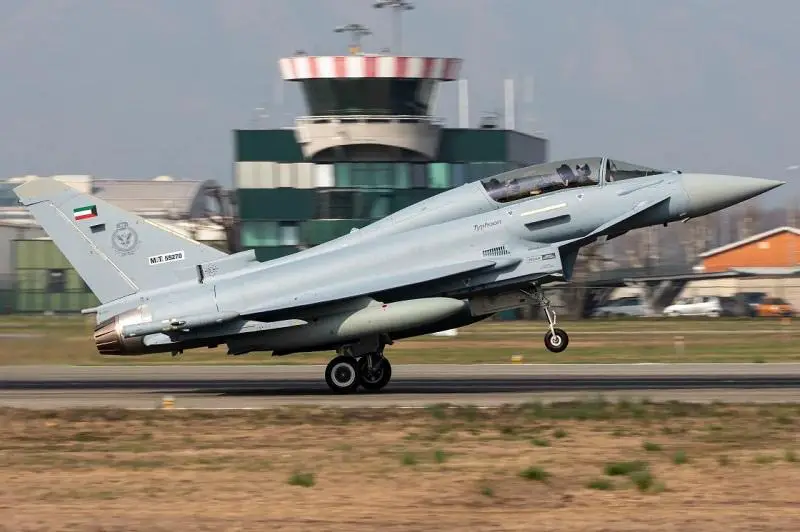The U.S. State Department has made a determination approving a possible Foreign Military Sale to the Government of Kuwait of Advanced Weapons in Support of Eurofighter Typhoon Aircraft Program and related equipment for an estimated cost of $397 million. The Government of Kuwait has requested to buy sixty (60) AIM-120 C-7/8 Advanced Medium Range Air-to-Air Missiles (AMRAAMs); two hundred fifty (250) MK-84 General Purpose 2000LB bombs; five hundred one (501) MK-83 General Purpose 1000LB bombs; three hundred fifty (350) KMU-556 Joint Direct Attack Munition (JDAM) tail kits for GBU-31V1 2000LB bombs; seven hundred two (702) MXU-667 Air Foil Groups (AFG) for GBU-48 Enhanced Paveway II (EPW-II) 1000LB bombs; and seven hundred two (702) MAU-210 Enhanced Computer Control Groups (ECCG) for GBU-48 Enhanced Paveway II (EPW-II) 1000LB bombs inert munitions, trainers, and training equipment; bomb components; spare, repair parts; personnel and training equipment. The principal contractors will be Raytheon Missiles and Defense, Tucson, AZ; and Lockheed Martin Missiles and Fire Control, Archbald, PA.

The AIM-120 Advanced Medium-Range Air-to-Air Missile, or AMRAAM, is an American beyond-visual-range air-to-air missile (BVRAAM) capable of all-weather day-and-night operations. It is 7 inches (18 cm) in diameter, and employs active transmit-receive radar guidance instead of semi-active receive-only radar guidance. It is a fire-and-forget weapon, unlike the previous generation Sparrow missiles which needed guidance from the firing aircraft. When an AMRAAM missile is launched, NATO pilots use the brevity code Fox Three. The AMRAAM is the world’s most popular beyond-visual-range missile; as of 2008 more than 14,000 had been produced for the United States Air Force, the United States Navy, and 33 international customers. The AMRAAM has been used in several engagements, achieving sixteen air-to-air kills in conflicts over Iraq, Bosnia, Kosovo, India, and Syria.

A general-purpose bomb is an air-dropped bomb intended as a compromise between blast damage, penetration, and fragmentation in explosive effect. They are designed to be effective against enemy troops, vehicles, and buildings. The primary U.S. GP bombs are the Mark 80 series. The Mark 80 series was not used in combat until the Vietnam War, but has since replaced most earlier GP weapons. It includes four basic weapon types: Mark 81 – nominal weight 250 pounds (113 kg), Mark 82 – nominal weight 500 pounds (227 kg), Mark 83 – nominal weight 1,000 pounds (454 kg) and Mark 84 – nominal weight 2,000 pounds (907 kg). Dumb Mk 80 bombs could be converted to smart bombs with attached kits. Joint Direct Attack Munition (JDAM)-equipped bombs are guided by an integrated inertial guidance system coupled to a Global Positioning System (GPS) receiver, giving them a published range of up to 15 nautical miles (28 km).

Paveway is a series of laser-guided bombs (LGBs). Pave or PAVE is sometimes used as an acronym for precision avionics vectoring equipment; literally, electronics for controlling the speed and direction of aircraft. Laser guidance is a form of Pave. Paveway II guidance kits were produced for the 2000 lb class MK 84 and BLU-109/B, the 1000 lb MK 83 and the 500 lb MK 82 bombs. Including foreign sales, more than 100000 Paveway II kits have been built, and production and upgrades are still continuing. The primary manufacturer for Paveway II is Raytheon, building the MAU-169( )/B series of CCGs. In the early 2000s, Lockheed Martin established itself as a second source, and currently produces the MAU-209( )/B CCG, which is interchangeable with the MAU-169( )/B. The current version of the MAU-209 is the MAU-209B/B, which has completely replaced the original MAU-209/B.















